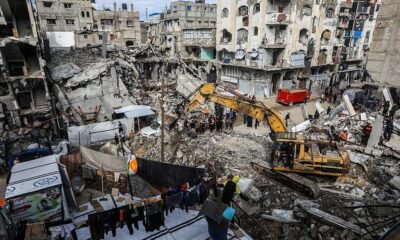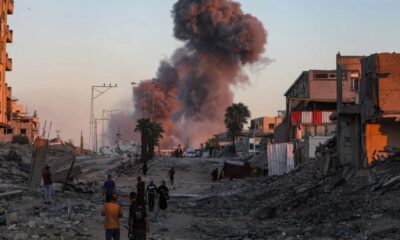KHAN YUNIS, (The Palestine Foundation Pakistan)The mayor of Khan Yunis and head of the Emergency Committee in the governorate, Alaa al-Batta, said on Saturday that the city has suffered unprecedented destruction, with around 80 percent of its area completely devastated by Israel’s genocide against Gaza.
Speaking at a press conference, al-Batta said initial estimates show more than 400,000 tons of rubble scattered across the streets of Khan Yunis, with hundreds of thousands more buried within destroyed neighborhoods following the obliteration of homes, buildings, and economic facilities.
He noted that the municipality has deployed nine field teams to reopen roads, but their efforts are severely hindered by the lack of heavy machinery required to deal with such massive devastation.
Infrastructure collapse
The Israeli occupation forces (IOF) destroyed and bulldozed over 206,000 linear meters of roads, representing 82 percent of the entire network.
The water network sustained 86 percent damage, with 296,000 meters of pipelines destroyed and 36 water wells completely out of service. Only eight wells remain partially operational. Three central water reservoirs were also destroyed in full.
In the sanitation sector, 130,000 meters of the sewage network were damaged (68 percent of the total), while 13,000 meters of the stormwater drainage system were destroyed (62 percent). About 1,900 of 2,100 rain traps were obliterated, a staggering 90 percent loss.
Two central wastewater treatment plants were completely destroyed, while three others were partially damaged.
Waste collection has come to a total halt after the destruction of the city’s main landfill in eastern Khan Yunis, forcing the municipality to establish temporary dumping sites in densely populated neighborhoods in the west. Around 350,000 tons of uncollected waste have now accumulated, with 11 garbage trucks destroyed and 90 percent of waste containers damaged.
The IOF bombardment also destroyed 136 public parks and squares, along with 66 municipal facilities. In addition, 200,000 meters of street-lighting networks were ruined, together with 7,400 lanterns and 7,200 light poles, rendering the city’s lighting system completely inoperable.
Al-Batta appealed to the international community and humanitarian organizations to urgently provide heavy equipment, fuel, and machinery to restore basic services in water, sanitation, and waste management.
He also called for the immediate entry of bulldozers and heavy machinery to clear the rubble and reopen main roads, describing the situation as catastrophic and warning that “life cannot resume in Khan Yunis without an urgent international response.”











